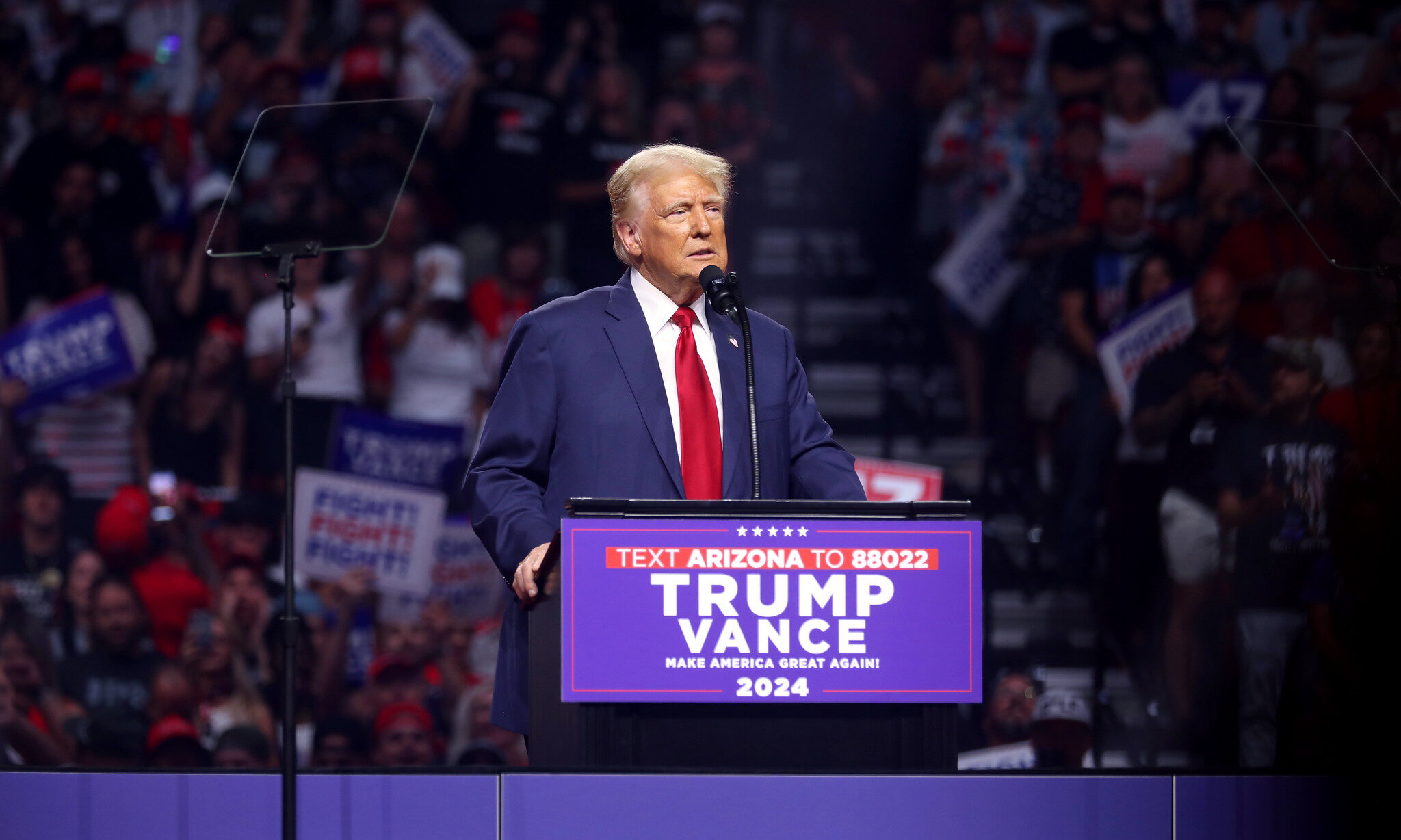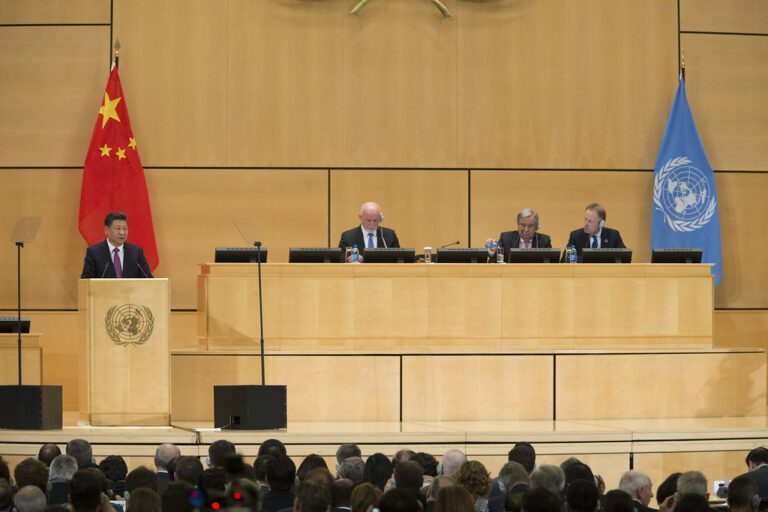The 2024 US Elections and their Implications for the EU’s China Policy: Views from CEE

As CHOICE closely monitored the 2024 US presidential race – the results of which have now effectively confirmed the victory of Donald Trump – we have asked a diverse group of experts from across Central and Eastern Europe (CEE) to share their insights on what a second Trump administration might mean for the EU, CEE, and their respective policies toward China.
This article is part of a series from CHOICE focusing on the impact of elections on countries’ China policy.

Dominika Urhová (@DUrhova)
China Analyst at the Association for International Affairs (AMO), Czech Republic
Like other European countries, the Czech Republic has been eager to learn the outcome of the US presidential election. The anticipation has been filled with questions about the future of transatlantic relations, European security, and European economies.
For the Czech Republic, Kamala Harris represented a safer and a more predictable option. Her victory was expected to bring a more stable economic environment and a less confrontational foreign policy, especially regarding China. However, Prague will now have to deal with the reality of Trump’s victory and the possibility of heightened trade protectionism that is likely to affect Czech automotive and machine building industries, which are highly dependent on the US market. Trump’s victory could also have fiscal consequences, including increased financial market volatility, higher inflationary pressures and a potential weakening of the Czech crown and other European currencies; albeit all of this will depend on which party ends up controlling Congress.
In terms of foreign policy, Trump is likely to push for greater involvement of European countries, including the Czech Republic, in European security, especially in the areas of defense spending and the war in Ukraine. While it is unlikely that the US would, under Trump, withdraw from NATO, his rhetoric could significantly undermine NATO’s deterrence posture, placing additional pressure on member states to invest more in defense. Trump’s victory could also lead to a more confrontational stance toward China, which may pose further challenges to European countries like the Czech Republic, for whom China remains a key trading partner, despite the accelerating de-risking efforts.
On a different note, Trump’s victory could have a positive impact in the Middle East as he is likely to return to expanding the Abraham Accords, which aligns well with the Czech Republic’s prioritization of establishing peace in the region. Overall, the atmosphere within the Czech political establishment remains optimistic, with several members of the government believing that Trump will not turn his back on Europe or the Czech Republic.

Dominika Remžová (@DominikaRemzova)
China Analyst at the Association for International Affairs (AMO), Slovakia
The initial reactions from Slovak political parties to Donald Trump’s victory revealed both convergence and divergence. Whereas both opposition and coalition parties emphasized the need for the EU to take a more proactive role in its own security – especially regarding defense spending by individual member states – the opposition was notably less enthusiastic about a second Trump administration. They raised concerns about the heightened risk of a trade war on two fronts: not only between the US and China but also between the US and the EU. In addition to highlighting the negative implications for the EU’s economic security, they also cautioned about the hard security implications for not just Europe but the rest of the world.
Contrary to this, several representatives of the governing coalition, including Prime Minister Róbert Fico, have expressed optimism about the Trump victory. Some even suggested that it could have a positive impact on global peace, pointing out Trump’s stated intention to end the war in Ukraine in one day. Fico implied that he would welcome such a quick solution, regardless of the form it takes, suggesting that the US could potentially cease its support for Ukraine entirely. This sentiment is in line with Fico’s broader stance on the conflict, which includes support for China’s proposed peace plan – a position he reiterated during his recent trip to Beijing, during which the two countries upgraded their bilateral ties to the level of a strategic partnership.
At the same time, and similarly to Orbán, Fico’s pursuit of stronger ties with China may come into conflict with Trump’s policies, particularly his protectionist stance and threats to impose up to 60 percent tariffs on all imports from China. Fico has been critical of the EU’s own mercantilist tendencies and Slovakia was one of the countries that opposed the bloc’s decision to impose tariffs on Chinese EVs.
Yet, despite all this, their contrasting views on China may not prove to be as significant a stumbling block as they might initially appear. Afterall, both Trump and Fico are opportunists not bounded by any ideological commitments. Moreover, Fico’s self-styled “sovereign foreign policy in all four cardinal directions,” including his tendency to cozy up to both Russia and China, serves mainly domestic political objectives. This can be seen in his recent statement that framed Trump’s victory as a “defeat of liberal and progressive ideas,” which he associates with the opposition, particularly the Progressive Slovakia party that finished second in the 2023 parliamentary elections.

Tamás Matura (@tamas_matura)
Associate Professor at Corvinus University of Budapest, Hungary
Donald Trump’s victory means a triumph for Viktor Orbán. The Hungarian Prime Minister has been a vocal supporter of Trump, believing that Trump’s return to the White House would boost his own political and economic standing. However, there is a caveat. While Trump presents himself as a fierce opponent of China, Orbán’s stance is the complete opposite. Over the past decade, the Hungarian government has pursued pro-China policies at the EU level while positioning Hungary as a haven for Chinese investments, complicating its relations with the US in the process. Because of this, it is difficult to see how the Hungarian side could please Washington and Beijing at the same time.
In one of his recent interviews, the political director of the Prime Minister’s office implied that the Hungarian government has been exploring ways to strike a deal with the Trump administration, especially given Trump’s disdain for the EU and its largest economy, Germany. As there is a possibility of the Chinese automotive investments in Hungary posing increasing challenges to Berlin, the deal is indeed plausible.
Starting from next year, the decreasing US political pressure on Hungary may embolden Orbán to play an even more disruptive role within the EU and beyond. Should Trump pursue his trade war with both China and the EU at the same time, some EU members may seek closer ties with Beijing, prompting Orbán to position himself as a mediator between Washington, Brussels, and Beijing. However, if Trump understands that cornering the EU and China at the same time would not make America great again and decides to keep the EU close to the US, pro-China voices like those of Orbán may well be marginalized.

Joanna Nawrotkiewicz (@nawrotkiewiczj)
Non-resident Research Fellow at the Centre for Asian Affairs at the University of Lodz, Poland
Poland’s government, like many others in Europe, has closely followed the US presidential race, recognizing its potential to reshape transatlantic relations. The ruling liberal coalition fears an inevitable clash in values with a Trump administration. Poland’s primary concern is the war in Ukraine, and Trump’s proposal to “end the war in 24 hours” – likely at Ukraine’s expense and with China as the mediator – poses serious regional security risks. For Poland, Trump’s return could signal a more transactional US-EU relationship, which may be precarious amid growing global challenges, including the democracy-autocracy divide.
Regardless of the outcome, Europe was likely to face increasing pressures to take a firmer stance on China, whether through Trump’s confrontational demands or Harris’s diplomatic approach. While China has traditionally been peripheral in Polish foreign policy, Beijing’s “no-limits friendship” with Moscow has made Poland more aware of China-related risks. It is against this backdrop that some observers were surprised by foreign minister Radosław Sikorski’s statement that Poland “does not want to take sides” between the US and China.
Nevertheless, Poland has shown little friendliness toward Beijing. Warsaw backed EU tariffs on Chinese electric vehicles, signaling its willingness to reduce dependency on China in key sectors. Moreover, if pressure mounts, Poland may feel compelled to align more closely with the US, given its reliance on American defense; though grand gestures like the 2019 Huawei espionage arrest are unlikely. Any major shift in Poland’s China policy will thus likely align with broader EU positions.
At the same time, the intensifying US-China rivalry is likely to shape Poland’s foreign policy. Prime Minister Donald Tusk’s recent statement that “the era of geopolitical outsourcing is over,” echoed by Sikorski, suggests that Europe must prepare to secure its own interests as the US pivots back to the Indo-Pacific. Indeed, Poland now leads NATO in defense spending – currently at 4% of GDP, with plans to rise to 5% by 2025 – which strengthens its position in response to Trump’s frequent “freeloader” criticism of the US allies.
Moreover, ahead of its EU Council Presidency, Poland is signaling an increased interest in the Indo-Pacific through Sikorski’s recent diplomatic tour of Singapore, Malaysia, and the Philippines – an unusual focus for Polish foreign ministers – and the creation of a role dedicated to Indo-Pacific relations. However, it remains unclear whether Poland will use its presidency to lead the EU toward a stronger de-risking stance on China, and whether the US presidency will influence this trajectory.

Una Aleksandra Bērziņa-Čerenkova (@UCerenkova)
Assistant Professor at Riga Stradins University, Latvia
When the officials working on foreign and security policy in Estonia, Latvia and Lithuania were publicly asked about the preferred outcome of the US presidential race, most adopted a composed and reserved attitude, abstaining from commenting on the choice of the American people. When asked about a potential Trump victory, they again responded similarly – along the lines of “we worked with the first Trump administration, we will find a way to work with the second.”
There was also the often-heard reassurance that NATO’s future does not rest on the US alone, and that a more withdrawn Washington would encourage Europe to take care of its own security. Beneath the calm facade, however, an underlying anxiety about a possible shift in US priorities prevailed, particularly regarding the redirection of US resources toward its main rival, China. As the US election day approached, it was the degree of this redirection that kept the Baltics on edge, especially since a Trump victory could mean less support for Ukraine and the NATO Eastern flank, as well as a more transactional “pay-to-play” foreign policy, which could prove too costly for smaller economies. This made Kamala Harris the preferred candidate in the Baltics, given her promise to balance both the European and Indo-Pacific theaters.

Vida Macikenaite (@macikenaite)
Assistant Professor at the International University of Japan, Lithuania
In Lithuania, it might seem as though domestic politics and the region’s security situation leave little room for any discussions on China. Following the parliamentary elections in late October, political elites and the media have been preoccupied with domestic politics, trying to figure out the next government coalition, while the war in Ukraine has diverted all attention to Lithuania’s national security and defense capabilities. These challenges, especially the latter one, were central to Lithuania’s concerns in the US elections. And while the immediate focus now is on what the new US administration means for Washington’s support for Ukraine and NATO allies, the underlying question is what approach the new administration will take toward China.
It was under the current Homeland Union-led coalition, which is set to step down before the end of this year, that Lithuania’s foreign policy outlook expanded beyond the traditional regions of its Western partners and Eastern neighbors. Earlier, some concerns about the implications of China’s rise were raised in Lithuanian political discourse, but only under the current government has it been openly acknowledged that competition with China is seen as the main challenge for the US, diverting its attention away from the Baltic region. The Homeland Union-led coalition has retained ownership of the China policy issue in Lithuanian politics, having placed the issue of relations with Taiwan on the government agenda.
At this point, this is the lens through which the outcome of the US presidential election will be evaluated, even under the new government, most likely led by the Social Democratic Party. The most significant long-term challenge identified by the US is its strategic competition with China. How the new US administration seeks to balance its commitment to European security and its approach to China will be central for Lithuania. The incoming Lithuanian government, currently in opposition, will also need to expand its security calculus to account for the China factor. Because of this, it will closely monitor the US administration’s approach, which is expected to bring more turbulence under Trump.

Stefan Vladisavljev (@vladisavljev_s)
Program Director at the Foundation BFPE for a Responsible Society, Serbia
Serbian officials define the country’s foreign policy as that of a sovereign state that is not yet a member of the EU, thus retaining the right to autonomously shape its foreign policy stance. Serbia’s approach is considered multi-vector, meaning it balances relations between liberal Western democracies and autocratic states, particularly in the East.
Relations with the US have been on an upward trajectory over the past eight years. Although there was a preference among Serbian citizens for a Trump victory – largely due to expectations about his role in potentially resolving bilateral disputes between the Western Balkans – Serbian officials maintained a position generally described as striving for continuity in their relations with both Western and Eastern countries.
However, it is undeniable that the previous Trump administration played a significant role in the modern development of relations between Belgrade and Washington, though it is equally clear that these relations continued under the administration of Joseph Biden. While Serbian officials hope to preserve the same level of bilateral relations with Washington, they also hope for the status quo in US-China relations. This is because the primary challenge to Serbia’s foreign policy stance arises from its unsustainability in the event of a deterioration in US-China relations, as Serbia aims to maintain good relations with both countries. Any potential escalation of confrontation between Washington and Beijing over issues such as Taiwan, human rights, and relations with Russia, could thus directly impact Serbia.
In principle, Serbia receives support from China in maintaining its territorial integrity, as reflected in China’s stance against Kosovo’s independence. Moreover, China does not provide suggestions or critiques regarding Serbia’s internal democratic challenges. While relations between Belgrade and Washington are improving, the US insistence on constructively addressing pressing internal issues stands in contrast to China’s more hands-off approach. Thus, Serbian officials’ main concern is that a new US administration could adopt a stricter stance, potentially prompting Serbia to further intensify its cooperation with Eastern partners as an alternative.
Written by
Dominika Urhová
DUrhovaDominika Urhová is a China Analyst at AMO, specializing in China's foreign policy, Cross-Strait relations and China's influence in the Middle East and the Western Balkans. In the past, she contributed to the Middle East Policy Journal and to the research outputs of the Observer Research Foundation. Dominika holds a Master's degree in Security Studies and Diplomacy from Tel Aviv University and a Bachelor's degree in Development Studies with a concentration in Economic Development from Lund University in Sweden.
Dominika Remžová
DominikaRemzovaDominika Remžová is a China Analyst at AMO, specializing in Chinese economy and industrial policy, supply chains, critical raw materials, electric vehicles and, more generally, Chinese foreign policy. In the past, she contributed to Taiwan Insight and The Diplomat, among others. Dominika is pursuing her PhD in Political Science and International Relations at the University of Nottingham. She earned her Master's degree in Taiwan Studies from the School of Oriental and African Studies (SOAS) in London and her Bachelor's degree in Chinese Studies from the University of Manchester.
Tamás Matura
tamas_maturaTamás Matura is the Founder of the Central and Eastern European Center for Asian Studies and works as an assistant professor of international relations at the Corvinus University of Budapest.
Joanna Nawrotkiewicz
nawrotkiewiczjJoanna Nawrotkiewicz is a Research Fellow at the Centre for Asian Affairs, Łódz University, Researcher at the Jagiellonian University, and an Expert for the CEE Digital Democracy Watch. She graduated from sinology and law at the MISH College of the University of Warsaw.
Una Aleksandra Bērziņa-Čerenkova
UCerenkovaDr. Una Aleksandra Bērziņa-Čerenkova is a Research Fellow at CHOICE and Head of the Political Science PhD programme and China Studies Centre at Riga Stradins University, Head of the Asia Programme at the Latvian Institute of International Affairs, a member of CHERN and European Think-tank Network on China (ETNC).
Vida Macikenaite
VidaMaciVida Macikenaite is an Assistant Professor at the Graduate School of International Relations, International University of Japan. Her research focuses on Chinese foreign policy and international relations in the region surrounding China.
Stefan Vladisavljev
vladisavljev_sStefan Vladisavljev is CHOICE Visiting Fellow. He is also the Program Coordinator of the Serbia-based non-governmental organization Foundation BFPE for a Responsible Society. He analyzes Chinese presence in Central and Eastern Europe with a special focus on Serbia and the Western Balkans.


